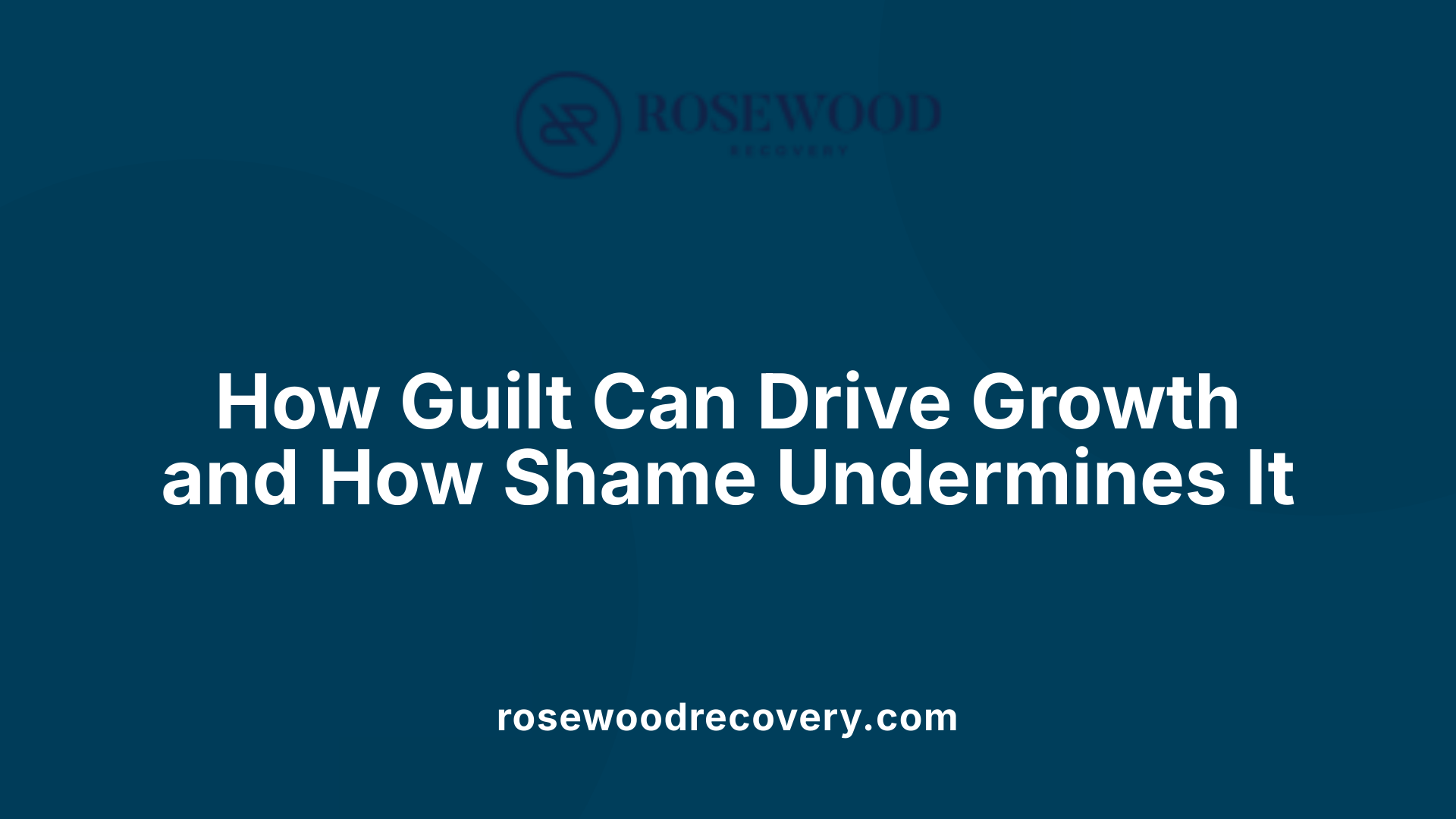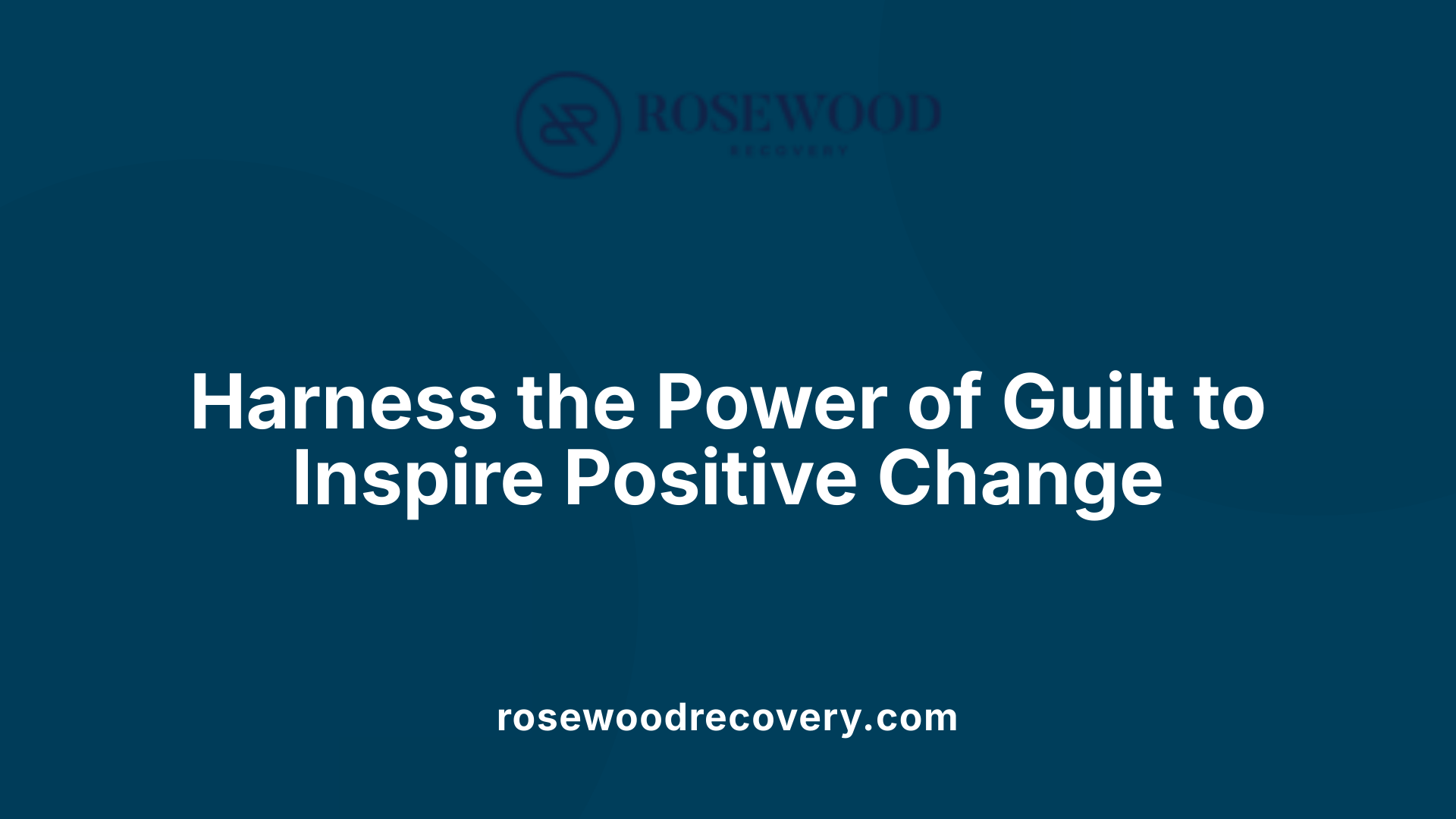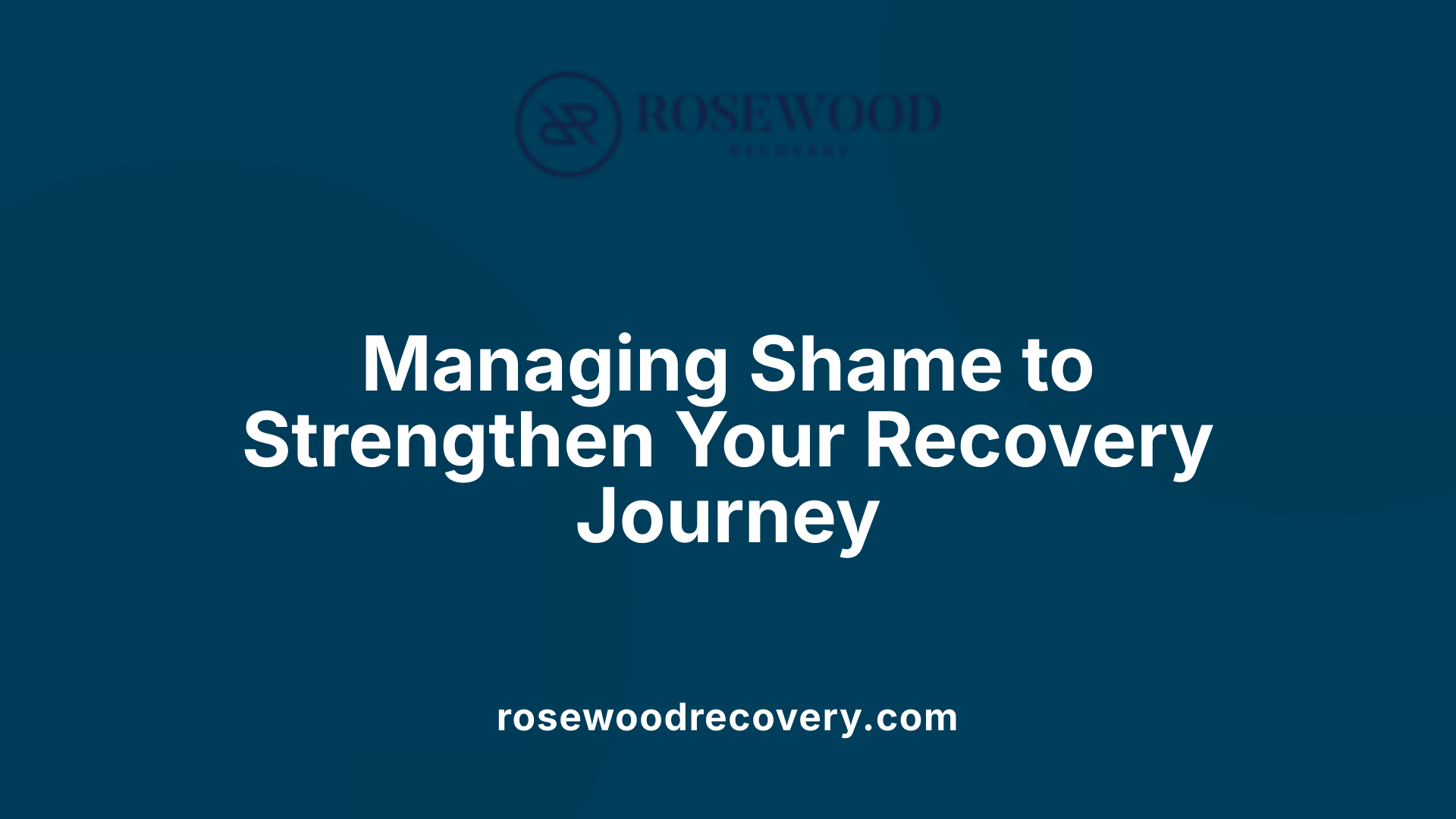The Emotional Complexity of Recovery
Addiction recovery involves more than overcoming physical dependency; it requires addressing deep-seated emotional challenges that impact mental health and long-term sobriety. Among these, feelings of guilt and shame frequently surface, shaping an individual's recovery journey. Understanding these emotions, their differences, and the crucial role of forgiveness can empower individuals to heal and sustain recovery.
Differentiating Guilt and Shame in Recovery

What are guilt and shame?
Guilt and shame are often confused, but they represent different emotional experiences. Guilt refers to feelings and judgments about specific actions or behaviors—essentially, what you’ve done wrong. Shame, in contrast, involves negative feelings about who you are as a person—your sense of self-worth and identity.
How do guilt and shame affect individuals in recovery?
During addiction recovery, individuals frequently grapple with both guilt and shame. Guilt can sometimes be a motivating force, pushing people to acknowledge their mistakes and strive for positive change. It encourages taking responsibility and repairing damaged relationships.
Shame, however, tends to be more harmful. It is linked to negative self-evaluation and can severely damage self-esteem. Untreated shame may lead to feelings of unworthiness, self-isolation, and increased risk of relapse.
How do guilt and shame influence self-perception and behavior?
Guilt highlights misaligned actions but leaves room for personal growth. People feeling guilt are more likely to engage in constructive behaviors such as making amends and seeking forgiveness. Shame casts the self as fundamentally flawed. This can impair emotional regulation, making recovery more difficult by fostering negative self-talk and hopelessness.
Understanding these differences is vital for recovery programs. Therapeutic approaches often focus on helping individuals channel guilt constructively while reducing shame’s destructive effects. Shifting self-attitudes from fixed self-blame to a mindset open to change can transform these emotions into tools for healing rather than barriers.
By distinguishing guilt as a response to behavior and shame as a perception of self, recovery strategies can better support emotional well-being and sustainable change.
The Role of Guilt in Motivating Change

What is guilt and how does it serve as a signal?
Guilt arises from the recognition that one’s actions have conflicted with personal values or caused harm. Unlike shame, which focuses on feeling bad about oneself, guilt centers on specific behaviors. This distinction is important because guilt can act as a constructive emotional signal, motivating individuals to take responsibility and seek repair.
How does guilt support recovery?
In addiction recovery, guilt often emerges as individuals become aware of the negative impact their substance use has had on themselves and others. This emotional awareness can prompt a commitment to change, driving efforts to modify behaviors and make reparations. Unlike shame, which can undermine self-worth and lead to self-isolation, guilt encourages personal accountability.
Treatment programs integrate this understanding by fostering self-examination and confession, such as in the 12-step model of Alcoholics Anonymous. These practices help individuals confront feelings of guilt constructively, paving the way for amends and growth.
How can guilt prompt making amends and personal growth?
Guilt motivates reconciliation behaviors, including acknowledging mistakes, apologizing, and taking concrete steps to rectify harm done. Through this process, individuals not only repair relationships but also rebuild their self-esteem and enhance emotional regulation.
Therapeutic approaches encourage transforming guilt from self-punishment into scaffolding for change—viewing oneself as capable of growth rather than fixed by past actions. This shift empowers people in recovery to forgive themselves, develop self-compassion, and foster long-term healing.
How do treatment programs address various forms of addiction?
Treatment programs employ a comprehensive mix of evidence-based therapies and medical interventions tailored to individual needs. These include cognitive-behavioral therapy (CBT), dialectical behavior therapy (DBT), motivational interviewing, and medications such as methadone or naltrexone to manage withdrawal and cravings. Settings vary from outpatient care to inpatient and residential rehab, ensuring appropriate levels of support. Family therapy and peer support groups like Alcoholics Anonymous also play vital roles in sustaining motivation and preventing relapse.
The Destructive Nature of Shame and Its Management

What is Shame and How Does It Affect Self-Worth?
Shame is a profound feeling of negative self-evaluation, where individuals view themselves as unworthy or fundamentally flawed. Unlike guilt, which is tied to specific actions, shame targets the very essence of one's identity.
This emotion can severely impair self-worth, leading people to feel isolated and unlovable. In the context of addiction recovery, shame often emerges as individuals recognize the extent of the impact their substance use has had on their lives and relationships.
How Does Shame Influence Relapse Risk?
Shame can be particularly destructive because it fosters intense self-criticism and hopelessness. These feelings increase the risk of relapse by triggering negative self-talk and emotional distress, which can push individuals back toward substance use as a coping mechanism.
Without proper management, shame undermines motivation and emotional regulation—two crucial elements needed to sustain recovery.
What Therapies and Strategies Help Reduce Shame?
Effective management of shame involves interventions that shift how individuals relate to their self-blame. Key therapies include:
- Cognitive Behavioral Therapy (CBT): Helps challenge and change negative thought patterns linked to shame.
- Trauma-Focused Therapies: Address underlying trauma that can exacerbate shame.
- Mindfulness and Self-Compassion Practices: Foster acceptance and reduce harsh self-judgment.
- Empathy-Driven and Narrative Therapies: Encourage reframing of self-blame toward growth rather than punishment.
Recovery programs often incorporate steps of self-examination and confession, such as in the 12-step Alcoholics Anonymous model, which facilitate confronting shame constructively.
What is the Difference Between Retributive and Scaffolding Self-Blame?
Understanding self-blame styles is essential to managing shame effectively:
| Self-Blame Type | Description | Impact on Shame and Recovery |
|---|---|---|
| Retributive Self-Blame | Views the self as fixed and unchangeable; punishment-focused | Makes shame and guilt destructive, deepening emotional pain |
| Scaffolding Self-Blame | Sees the individual as capable of change and growth | Allows shame and guilt to be motivational and supportive |
Therapies aim to facilitate a shift from retributive to scaffolding self-blame, helping individuals use feelings of shame to motivate positive change rather than self-condemnation.
By applying these strategies, individuals in recovery can alleviate the destructive power of shame and foster a path toward healthier self-worth and long-term sobriety.
Forgiveness: A Cornerstone of Emotional Healing in Recovery

What are the dimensions of forgiveness in addiction recovery?
Forgiveness in recovery is a multifaceted process that involves self-forgiveness, forgiving others, and seeking forgiveness from those harmed. Each dimension plays a unique role in emotional healing. Self-forgiveness requires acknowledging responsibility, cultivating compassion for oneself, expressing remorse, making amends, and focusing on personal growth. Forgiving others helps to break cycles of resentment and trauma that often trigger substance use. Seeking forgiveness from loved ones involves admitting past harms, expressing regret, and working to repair damaged relationships.
What techniques support effective self-forgiveness?
Self-forgiveness is pivotal for moving forward. Techniques include journaling to articulate feelings and progress, affirmations to reinforce self-worth, cognitive reframing to challenge negative self-talk, and making amends as tangible steps towards reconciliation. Mindfulness and meditation can cultivate present-moment awareness, reducing shame and fostering compassion. Symbolic acts like writing and safely burning a letter or planting a tree can symbolize release and renewal. Professional support from counseling or group therapy strengthens these practices and guides healing.
How does forgiving others and seeking forgiveness aid recovery?
Forgiving others alleviates emotional burdens tied to past trauma or abuse, fostering emotional relief and preventing prolonged resentment that hinder recovery. Seeking forgiveness creates opportunities to mend relationships, restore trust, and rebuild social support, which are crucial for sustained sobriety. This reciprocal process encourages openness and emotional growth, which buffer against relapse triggers such as shame and anger.
What physical and mental health benefits result from forgiveness?
Research affirms that forgiveness contributes significantly to improved mental health. It lowers depression, anxiety, and stress, while reducing the risk of relapse. Forgiveness also promotes physiological benefits, including lower blood pressure and decreased risk of heart disease. These benefits highlight forgiveness not just as a spiritual or emotional act but also as an important component of holistic health during addiction recovery.
How are comprehensive treatment services connected to forgiveness and emotional healing?
Comprehensive treatment programs integrate physical, psychological, and social therapies addressing addiction and its emotional aftermath, including guilt and shame. These services often incorporate forgiveness practices through 12-step programs, individual and group therapy, and mindfulness-based approaches. By fostering hope, self-love, and community support, comprehensive care enhances the capacity for forgiveness, emotional regulation, and long-term recovery success.
Integrating Forgiveness Practices into Recovery Programs
Use of forgiveness in 12-step programs and therapy
Forgiveness is deeply woven into many recovery protocols, especially within 12-step programs like Alcoholics Anonymous. These programs encourage self-examination and confession, helping individuals confront guilt and shame which are common in addiction recovery. Forgiveness practices also play a crucial role in individual and group therapy sessions, supporting emotional healing and reducing the burden of negative emotions.
Practical exercises for fostering forgiveness
Several effective practical exercises can help individuals cultivate forgiveness during recovery. These include journaling to express emotions, mindfulness and meditation to develop present-moment awareness, and symbolic acts such as writing and then burning letters to signify letting go. Planting a tree or engaging in other tangible gestures can also represent growth and renewal.
Professional support in forgiveness and emotional healing
Professional guidance is vital for navigating the complex process of forgiveness. Counselors and mental health professionals provide therapies that facilitate self-forgiveness and forgiving others. Group therapy offers support through shared experiences, enhancing empathy and understanding. Such support fosters healthier emotional processing and contributes to relapse prevention.
Spiritual aspects of forgiveness
Forgiveness in recovery is often considered a spiritual act linked to faith and purpose. Many recovery programs integrate spiritual principles emphasizing forgiveness as a pathway to spiritual health. Embracing forgiveness can deepen a sense of connection, meaning, and hope, all of which bolster sustained recovery and well-being.
Emotional Strategies for Sustaining Long-Term Recovery
Managing guilt and shame to prevent relapse
Guilt and shame are common emotional responses in addiction recovery. Guilt relates to feelings about specific actions, while shame affects how individuals perceive themselves. Effectively managing these emotions is crucial because guilt can motivate positive change and making amends, whereas shame may damage self-worth and increase relapse risk if left unaddressed.
Tools such as mindfulness and self-compassion can help individuals recognize and process these emotions without becoming overwhelmed. These approaches promote emotional regulation, helping reduce negative self-talk and encouraging healthier responses to setbacks.
Benefits of self-compassion and mindfulness
Self-compassion allows recovering individuals to treat themselves kindly during moments of struggle. Combined with mindfulness, which fosters present-moment awareness, these strategies support emotional healing and resilience. They provide constructive ways to acknowledge mistakes without harsh judgment and encourage growth-oriented thinking.
Incorporating practices like journaling, meditation, and affirmations helps transform self-blame from destructive to supportive by fostering a nurturing mindset.
Importance of support groups and therapy
Support groups and professional therapy play vital roles in sustaining recovery. Programs such as the 12-step model encourage self-examination and confession, helping individuals confront guilt and shame in a supportive community. Cognitive-behavioral and trauma-focused therapies are effective for addressing deep-rooted emotional struggles, including those linked to past trauma.
Therapies that shift the individual's self-attitude—moving from retributive blame (seeing oneself as unchangeable) to scaffolding blame (viewing oneself as capable of growth)—help transform shame and guilt into motivators for recovery.
Balancing emotional accountability and growth
Recovery requires balancing emotional accountability with self-forgiveness and growth. Accepting responsibility for past behaviors through making amends and seeking forgiveness can repair relationships and reduce emotional burden. At the same time, practicing self-compassion prevents overwhelming shame.
By adopting this balance, individuals foster moral development and avoid self-isolation. This approach enhances motivation and emotional regulation, decreasing relapse risk and supporting sustained long-term recovery.
Moving Beyond Guilt and Shame Through Forgiveness
Recovery from addiction is as much an emotional journey as it is a physical one. By understanding and differentiating feelings of guilt and shame, individuals can harness guilt as a catalyst for positive change while mitigating the destructive impact of shame. Forgiveness—of oneself and others—is pivotal in this process, promoting mental wellbeing, repairing relationships, and reducing relapse risk. Comprehensive treatment programs that integrate emotional healing strategies, including forgiveness practices, support sustainable recovery and foster holistic health. Ultimately, embracing forgiveness enables individuals to rebuild their lives with hope, self-compassion, and resilience.
References
- How to Overcome Guilt and Shame in Recovery | AAC
- Forgiveness in Recovery: Why It Matters & How to Begin
- Managing shame and guilt in addiction: A pathway to ...
- How to Deal with Shame and Guilt in Recovery
- The Intersection of Forgiveness and Recovery: Pathways to ...
- FindTreatment.gov: Home
- Substance use treatment | Washington State Health Care ...




